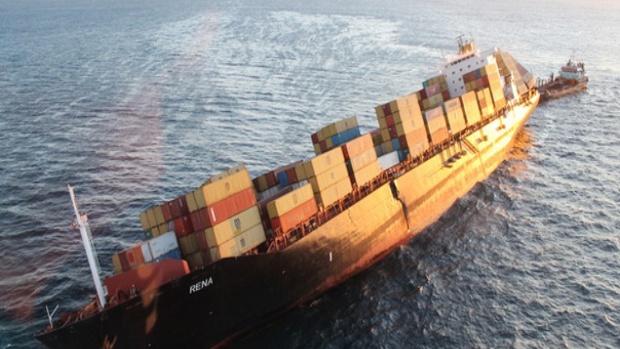Rena To Stay Or Go? Guess How Much It's Cost So Far!
- Publish Date
- Tuesday, 8 September 2015, 10:06AM

The environment and the community would be no better off - "and possibly worse" - if the Rena wreck is removed, counsel for the ship's owners has argued.
Yesterday was the first day of the six-week hearing regarding a resource consent application by the Rena's owners and insurers to leave the wreck where it lies on Astrolabe Reef (Otaiti).

Matt Casey QC told the panel the environment and the community would be no better off if the Rena was removed.
Members of the public, including a large contingent of iwi and hapu representatives, filled the public gallery at the ASB Arena's Stadium Lounge to listen to the first day's statements. The proceedings were opened by panel chairman, retired environment court Judge Gordon Whiting, who assured the gathering that the fate of the wreck was far from decided.

Konstantinos Zacharatos, the representative of Rena's owners, Daina Shipping Company, apologises for the wrecking of the Rena. Photo / John Borren
Matt Casey QC, who appeared on behalf of Rena's owners, told the panel "the environment and the community will be no better off - and possibly worse" if the Rena wreck was removed.
Mr Casey said there had been contamination during the wrecking, in particular from copper clove, tributyltin (TBT), polycyclic aromatic hydrocarbons (PAHs), heavy fuel oil and possibly cryolite.
He said the potential harm to human life was minimal.
"The owner's approach has been to do what is right for the community and the environment.
"We cannot turn back time ... the owners are de-risking the wreck so what remains is environmentally benign as possible."
It was important to bear in mind, he said, that if consent was declined or not exercised, the existing contaminants would remain and there would be no monitoring, contingencies or mitigation to address them.
Mr Casey said the salvage operations had so far run to a cost in excess of $500 million, making it the second most expensive salvage in maritime history, second only to that of the Costa Concordia.
"The wreck now joins the pantheon of wrecks around the coast of New Zealand which, in our short history, numbers somewhere around 3000."
Mr Casey said that under the Maritime Transport Act, the ship had ceased to be a hazard to navigation and was no longer classed a hazardous ship.
The first witness called by the applicant was Captain Roger King, a master mariner with Technical Marine Consultants, who has been involved in the salvage process for most of the four years since the ship ran aground.
Mr King detailed the history of the wreck and the difficulties of the salvage with a slideshow showing the salvage progress and stages of removal of parts of the wreck.
Last to speak yesterday was Konstantinos Zacharatos, the representative of Rena's owners, Daina Shipping Company. He told the hearing: "I wish to acknowledge the impact of the grounding on the community and to again sincerely apologise and express my regret for the incident and to thank all the volunteers.
"They were instrumental in minimising the effects of the grounding and in ensuring the environmental recovery that has been observed."
Mr Zacharatos said four years on from the grounding, representatives of the owners were still trying to honour their promise to provide a responsible resolution of the incident.
"With the valuable feedback of the community and iwi, we have extended the works performed on the site on several occasions to the point where, with the exception of the large cruise ship in Italy, this is by far the most expensive operation in maritime history."
Source: Bay of Plenty Times
Take your Radio, Podcasts and Music with you

